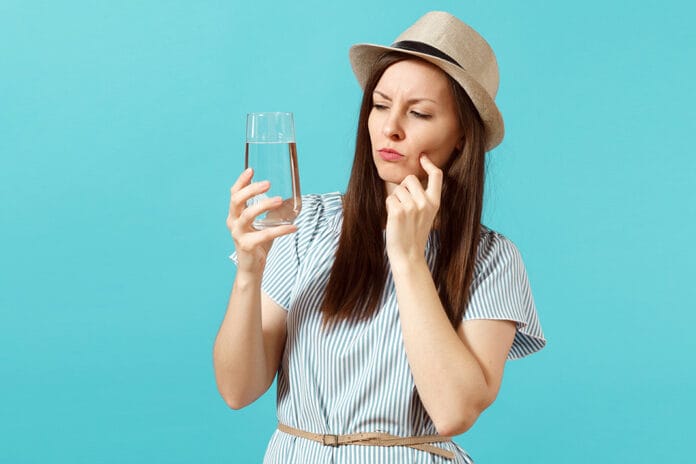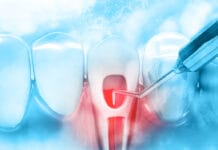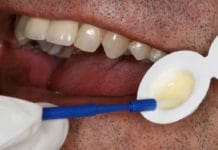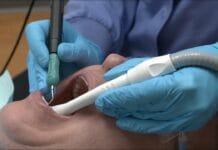“I don’t like water.” What is it with patients who say they don’t like water? How can that be when 60% of our body and 90% of our blood is made up of water?1
It’s like saying, “I don’t like oxygen.” Well, maybe not that extreme, but you get my point. Water is essential for every organ to function correctly. The skin contains 64% water, muscles and kidneys 79%, and bones 31%.2 We lose water throughout the day with perspiration, respiration, and urination.
By not drinking at least the recommended minimum of eight glasses of water a day, there will be a deficiency resulting in dehydration. Consuming products containing alcohol and caffeine further reduces the amount of water in the body, which, along with medications, can lead to certain oral pathologies due to xerostomia.
Dehydration has already occurred when the thirst feeling becomes present. It’s certainly necessary to increase the amount of water, especially in hot weather or when the body is ill. Serious complications can occur when there is a water deficit, such as urinary and kidney problems, seizures, and low blood volume.3
While it is widely known that the older population has a higher propensity to xerostomia, a study was conducted on college-age students who experienced the same symptoms. The goal of the study was to look at the relationship between xerostomia and the gingival condition in those students. The conclusion was that xerostomia had an indirect relationship to dental plaque; however, nasal congestion and caffeinated coffee and tea consumption also affected xerostomia. The findings suggest that xerostomia should be considered in the screening process for gingivitis risk, even in young adults.4
A dental patient, Barbara, presented with xerostomia and generalized gingivitis, likely induced by her list of medications. Her ropey saliva and cracked tongue certainly pointed to a dry mouth, although she was unaware of it. Often, when there is a slow progression of symptoms, the patient is unaware of the changes as it becomes the new normal.
Dental hygienists are perfectly aligned in assessing problems before the patient is aware and can help navigate them to healthier outcomes. Some signs of xerostomia can include dry, cracked tongue, difficulty swallowing, and ropey and/or bubbly saliva. This subjective finding remains a burden for many individuals and can result in rampant decay, oral infections, taste changes, halitosis, or burning mouth.5
I asked Barbara about her dry mouth and what she did to help ease the symptoms. “Nothing, really. I don’t drink water; I don’t like it.”
As an avid water drinker, I have a difficult time understanding this decision. I do understand that not all water is equal. Depending on the water source, it can have a chemical taste due to sanitation practices. I wondered if she had ever tried mixing water with lemon, cucumbers, or blueberries? She had not.
Why Drink Water?
Saliva helps digest food and keeps not only the mouth moist but also helps lubricate the eyes and nose. Water is necessary to loosen joints, which contain 80% water. Long-term dehydration can reduce the joint’s ability to absorb the shock that leads to joint pain.1
Remember that the blood is 90% water? It carries oxygen to different parts of the body. Lack of water can stagnate blood, which can lead to cysts and tumors.6,7
Water also helps regulate body temperature as water is stored in the middle layers of the skin and comes to the surface as sweat when the body heats up; that evaporation allows the body to cool.
Some scientists have suggested that too little water in the body increases heat storage, and the body is less able to tolerate heat. Water is also necessary to flush the body of waste, maintain blood pressure, aid in weight loss, and prevent kidney damage.1
Natural Alternatives
Many plants can be used to help the body and be easily added to a bottle of water. Drinking water is necessary for bodily functions and should be consumed throughout the day. The correct term for a medicinal herbal extraction using water is called a decoction, whereby the herbs are simmered prior to straining, whereas a tea is steeped. For those who are not inclined to drink water, making either a decoction or a tea can be one solution to offer our patients.
Herbal decoctions and teas have many useful benefits. These “teas” are found in organic sections in the grocery store but contain little to no caffeine when compared to their sisters, black and green tea.
For example, chamomile flowers (Chamaemelum nobile) is known for calmness to help with sleep, but it’s also a wonderful digestive aid and is anti-inflammatory. Its use for treating arthritis and other inflammatory conditions is widely known. Cinnamon (Cinnamomum verum) is known by many as a blood stabilizer, but because it’s warming and stimulating, it improves circulation, and helps to clear congestion.
One herb many of us can benefit from is lemon balm (Melissa officinalis). A member of the mint family, this highly medicinal plant serves a greater purpose than simply tasting great. Its volatile oils are a good remedy for stomach distress and nervous exhaustion. It serves as a helpful herb for insomnia caused by grief and sadness. Lemon balm is also rich in polyphenols, which have a strong antiviral action.8
Unfortunately, many people are suffering from sadness and grief due to the current state of our world. Using lemon balm as a decoction can be a way to not only hydrate but support the body in other ways.
Personally, I make a decoction several times a week and add it to my water bottle. I choose herbs that support my immune system in the winter and herbs that refresh and cool in the summer. Medicinal plants have a variety of properties that are antiviral, antifungal, and antibacterial.
If not grown myself, I purchase dried plant material from organic farms. I use two teaspoons of dried herbs to one cup of boiling water. I first boil the water, add the herbs and remove it from the heat source. It takes several hours for medicinal extraction of flowers and leaves, even longer for roots and stems. Once the decoction is ready, I drink 50/50 decoction/water throughout the day. It’s a means of staying hydrated and receiving the medicinal support my body needs to tackle the day-to-day stress.
I invite you to learn more about plant medicine and how to integrate those properties into your daily life by visiting your local apothecary, taking a class, or reading about medicinal herbs. Once you have discovered it for yourself, why not share the experience with your patients, especially the ones who don’t like water?
Dental hygienists have an advantage in caring for our patients. We have access to a full medical history that helps us uncover potential problems. I began the dialogue with Barbara using motivational interviewing techniques after gaining her permission. I then proceeded to discuss options that could benefit her and make her oral environment not only more comfortable but decrease her disease risk.
She was open to hearing the benefits and options and was able to find a way to increase hydration during the day. She plans to drink at least two glasses of water with a squirt of lemon juice to start and increase her water consumption from there. By adding a ¼ teaspoon of baking soda to her lemon water, the pH will rise making her water both more appetizing and basic.9 I plan to check in on her in a few weeks to see what differences she has noticed. It’s important to meet our patients where they are. I have found that asking open-ended questions allows the patient to be a part of the solution, giving them autonomy in their own health.
Before you leave, check out the Today’s RDH self-study CE courses. All courses are peer-reviewed and non-sponsored to focus solely on high-quality education. Click here now.
Listen to the Today’s RDH Dental Hygiene Podcast Below:
References
- McIntosh, M. (March 10, 2023). Fifteen Benefits of Drinking Water. Medical News Today. https://www.medicalnewstoday.com/articles/290814
- Water Science School, The Water in You: Water and the Human Body. (2019, May 22). S. Geological Survey. https://www.usgs.gov/special-topics/water-science-school/science/water-you-water-and-human-body#overview
- Mayo Clinic Staff. (2021, October 14). Mayo Clinic. https://www.mayoclinic.org/diseases-conditions/dehydration/symptoms-causes/syc-20354086
- Mizutani, S., Ekuni, D. Relationship Between Xerostomia and Gingival Condition in Young Adults. J Periodontal Res. 2015; 50(1):74-9. https://pubmed.ncbi.nlm.nih.gov/24697562/
- Villa, A., Connell, C., Abati, S. Diagnosis and Management of Xerostomia and Hyposalivation. Therapeutics and Clinical Risk Management. 2015; 11:45-51. https://www.ncbi.nlm.nih.gov/pmc/articles/PMC4278738/
- Endo, Y., Torii, R., Yamazaki, F., Sagawa, S. Water Drinking Causes A Biphasic Change in Blood Composition in Humans. Pflugers Arch-Eur J Physiol. 2001; 442(3): 362-8. https://pubmed.ncbi.nlm.nih.gov/11484766/
- Song, Y., Hu, J., Wang, H., Wang, L. Research on the Modern Clinical Herbal Administration Rules in TCM Treatment of Ovarian Cysts Based on Data Mining. Journal of Traditional Chinese Medical Sciences. 2017; 4(2): 222-231. https://www.sciencedirect.com/science/article/pii/S2095754817300819
- Gladstar, R. (2012). Medicinal Herbs – A Beginner’s Guide. Storey Publishing.
- Eske, J. (2019, March 8). Health Benefits of Baking Soda and Lemon Juice. Medical News Today. https://www.medicalnewstoday.com/articles/324653












